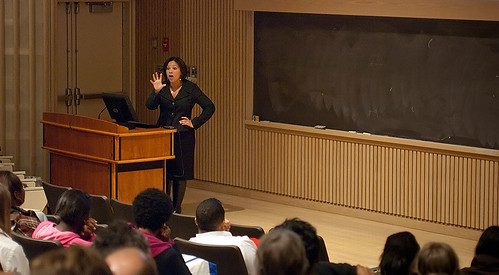Princeton professor Melissa Harris-Lacewell spoke about the current racial climate in America Wednesday night as part of ALST Day celebrations on campus.
Harris-Lacewell, a frequent contributor to MSNBC and other media outlets, tackled the broad topic by explaining race in four ways: racial context, race as a factor in candidate choice, race and governing, and race inequality and policy-making.
She explained how events such as September 11, the war in Iraq, and Hurricane Katrina are racialized, but how the effects are politicized.
ŌĆ£After Hurricane Katrina, the American sentiment was, ŌĆśHow can we execute a war overseas if we cannot give water to an American city for three days?'ŌĆØ
 |
| Melissa Harris-Lacewell speaks at 51│į╣Ž═° on Wednesday about ŌĆ£Race and the Age of Obama.ŌĆØ (Photo by Brooke Ousterhout ŌĆÖ10) |
By identifying these trends, Harris-Lacewell explained how the 2008 election with its open-seat contest in both parties and emerging ŌĆ£youth technologyŌĆØ such as Facebook and Twitter crossed many borders, assisting ObamaŌĆÖs rise to power.
ŌĆ£These new technologies created echo chambers so people could immediately see what was going on,ŌĆØ said Harris-Lacewell. ŌĆ£It made it more democratic because people could rely less on external authority.ŌĆØ
She explained that while America is not in a post-racialization era, it is in a different racial climate.
ŌĆ£There are new racial possibilities and they have everything to do with addressing something that at the turn of the 20th century was described by (W.E.) DuBois as a doublethink,ŌĆØ she said. ŌĆ£It is a double conscience descent of two-ness within the American context that the African Americans would all somehow find a way to heal the double conscience of being both black and American.ŌĆØ
Harris-Lacewell said that attending the 2008 Democratic National Convention in Denver was when she personally sensed the possibility of healing that double conscience.
Students seemed to appreciate Harris-LacewellŌĆÖs clear dialogue. ŌĆ£She really addressed the issues of race in an organized and very honest way,ŌĆØ said Lauren Lisbon ŌĆÖ11.
ŌĆ£I think that as an African American woman academic she has a unique vantage point from which to analyze the politics of race in the current period,ŌĆØ said sociology professor Rhonda Levine, who organized Harris-LacewellŌĆÖs visit. ŌĆ£She has an ability to draw on multiple political meanings of important racial issues to provide a coherent explanation.ŌĆØ
Harris-LacewellŌĆÖs appearance was part of a celebration of 51│į╣Ž═°ŌĆÖs .
On Tuesday night, Rex Nettleford, a Caribbean scholar, cultural historian, and political analyst, delivered the W.E DuBois Lecture. An open house with music and food was held earlier the same day.